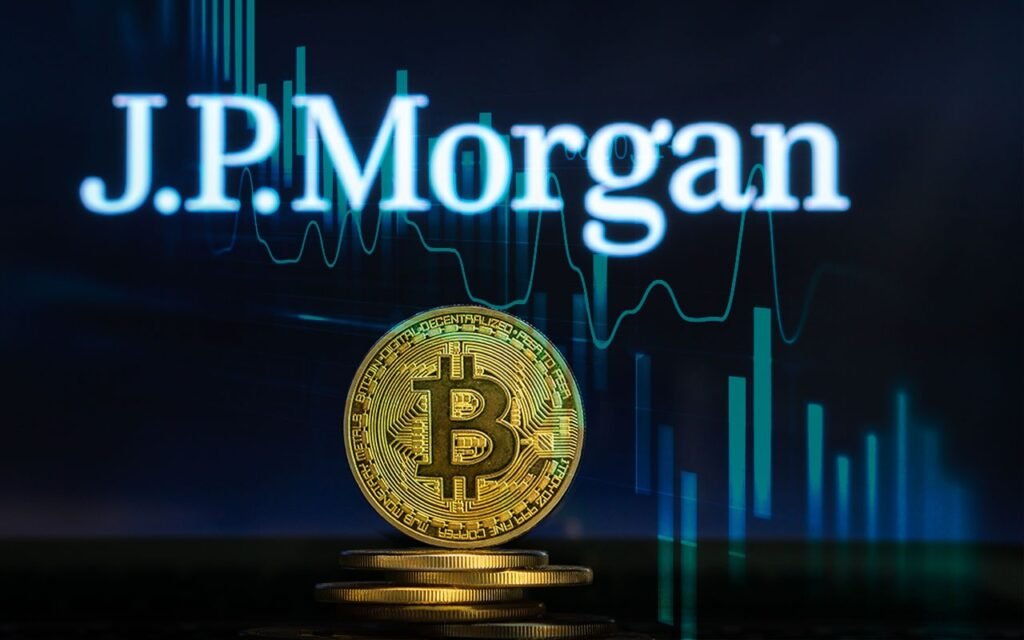The biggest bank in the US based on assets, JPMorgan Chase, has been heavily entering the Bitcoin market. The bank’s most recent data to the U.S. Securities and Exchange Commission (SEC) show a significant rise in its Bitcoin ETF holdings, which have jumped to an astounding $1.7 billion. This increase in ownership points to institutional investors’ rising faith in the possibilities of Bitcoin and the more general cryptocurrency industry.
JPMorgan’s Bitcoin ETF Investments
JPMorgan’s $1.7 billion in Bitcoin ETF holdings includes investments in prominent exchange-traded funds, reflecting a broader strategy to gain exposure to Bitcoin without directly holding the cryptocurrency itself. The bank’s investments are spread across several well-known Bitcoin ETF products, including:
BlackRock’s iShares Bitcoin Trust (IBIT): $1.27 billion
Fidelity’s Wise Origin Bitcoin Fund (FBTC): $288 million
ProShares Bitcoin Strategy ETF (BITO): $527,502
Bitwise Bitcoin ETF (BITB): $65,881
Grayscale Bitcoin Trust (GBTC): $36,418

This diversified approach allows JPMorgan to gain exposure to Bitcoin’s price movements while tapping into the institutional demand for more regulated, easily tradable forms of digital assets. With Bitcoin ETFs, JPMorgan can access the cryptocurrency market’s upside without the regulatory complexities and security risks associated with directly owning the digital asset.
Institutional Bitcoin Adoption
The increase in JPMorgan’s Bitcoin ETF holdings coincides with institutional investors progressively showing faith in Bitcoin prices and other cryptocurrencies as components of their portfolios. Traditionally, conventional financial institutions have seen cryptocurrencies with mistrust; nevertheless, this perception has changed recently. Major companies like JPMorgan’s growing participation indicate that institutional investors find possible value in these digital assets, as a store of value and a speculative investment.
The larger financial sector mirrors this trend as other big firms, including Goldman Sachs, Fidelity, and Morgan Stanley, have also invested in Bitcoin and cryptocurrency. Many of these companies now provide their customers with Bitcoin-related investment products, driving digital assets to more common use. The fact that JPMorgan decided to commit a significant sum of money to Bitcoin ETFs shows a rising acceptance of cryptocurrencies as a valid part of the worldwide financial system.
Remarkably, Bitcoin’s possible ability as a hedge against inflation and economic uncertainty has grown even more crucial among institutional investors. Bitcoin is progressively seen as a potential store of value, like gold, as central banks keep creating money at previously unheard-of rates and providing economic stimulation. Large-scale investors, trying to diversify their portfolios and lower risks in the face of unknown global financial conditions, have become more interested.
Bitcoin ETF Integration
Exchange-traded funds (ETFs) have become a necessary component of the investment scene for both personal and institutional investors. They have been very important in closing the distance between conventional finance and the bitcoin market by providing a controlled and readily available method of investing in the coin.
For JPMorgan, entering Bitcoin ETFs is also a strategic choice to provide its customers access to the expanding digital asset market within the framework of a controlled financial instrument.
Moreover, Bitcoin ETFs give institutional investors increased liquidity, openness, and simplicity of access to Bitcoin assets.
Institutional Bitcoin Impact
The rising investments by JPMorgan and other institutional players in Bitcoin ETFs could have major effects on the broader cryptocurrency market. Among the most obvious consequences is the possibility for more market liquidity. Demand for Bitcoin ETFs will probably increase as institutional investors keep including Bitcoin exposure in their portfolios, improving the market’s liquidity and efficiency.

Furthermore, the increasing presence of institutional investors in Bitcoin might result in more legislative clarity. As more financial institutions enter the bitcoin scene, regulators will probably add more thorough systems for regulating and supervising digital asset investments. This could lower some of the market’s uncertainty, thereby appealing to other institutional players who might have been reluctant to make investments because of legal issues.
A further crucial possible result is the change in the price of Bitcoin. As more institutional money flows into Bitcoin via ETFs, the growing demand could cause the price of Bitcoin to rise. Early investors would gain from this, as well as from increased demand from institutional and retail buyers hoping to profit from price rises.
Final thoughts
The fact that JPMorgan decided to raise its Bitcoin ETF holdings to $1.7 billion amply shows institutional trust in the cryptocurrency sector. The bank’s deliberate foray into digital assets fits a larger pattern among financial institutions, indicating that Bitcoin and other cryptocurrencies are considered respectable and valuable parts of investment portfolios.
As more institutional investors enter the market and regulatory systems become more solid, the Bitcoin market will likely keep changing as Bitcoin ETFs are adopted. Bitcoin’s place in the global financial system will probably grow as this trend develops since it presents investors with fresh prospects and helps digital assets become more widely accepted.

